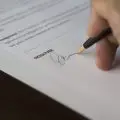
19 Oct What Is An Examination Under Oath? Complete Guide
When preparing for an examination under oath or any other type of legal proceeding, it can be a little nerve-wracking to make sure you fully understand the scope of the situation. I was curious about what an examination under oath entails. So, I did some digging into examinations under oath.
So what is an examination under oath? An examination under oath is a contractually obligated legal proceeding in which a representative of an insurance provider questions an insured. The purpose of the examination is to look further into the claims of the insured and shed light on both the validity and extent of the claim.
Unless you are somewhat involved with litigations regularly, the various complex legal terms that are thrown around can be confusing. It’s important to know what you are preparing for and what you are walking into when involved in something like an examination under oath, in order to increase your odds of a positive outcome.
Examinations Under Oath Explained
Without a doubt, the words “examination under oath” sound serious and somewhat daunting, especially if you are the one being examined. Truth is, there is legitimacy to the serious and daunting nature of an examination under oath. The proceeding is meant to bring forth the facts in an individual’s claim. The purpose is that the insurance company can then determine whether or not the claims are reasonable or not.
Because of the nature of this examination, it is not unexpected that the insurance company representative would aim to intimidate the insured in order to reveal inconsistencies in their story. Because of this, it is important to go into an examination under oath fully prepared. Getting your facts straight and retaining pertinent information will help to uphold your claim.
Minimizing Insurance Fraud
 While slightly intimidating and anxiety-inducing, an examination under oath is not indicative of a denied claim. This is a fairly standard procedure that both protects the insurance company from fraud and helps to maintain order in the system. It is estimated that nearly $80 billion in fraudulent insurance claims are made annually in the United States alone. This staggering number has drastic effects on the bills of everyone covered by insurance, as the companies must recoup their great losses.
While slightly intimidating and anxiety-inducing, an examination under oath is not indicative of a denied claim. This is a fairly standard procedure that both protects the insurance company from fraud and helps to maintain order in the system. It is estimated that nearly $80 billion in fraudulent insurance claims are made annually in the United States alone. This staggering number has drastic effects on the bills of everyone covered by insurance, as the companies must recoup their great losses.
Because of these numbers and their great effects, examinations under oath are favored by all of us. Yes, they can be intimidating when you are the one under examination. However, there is a good reason for the practice. You should prepare thoroughly for your examination, in order to fully present the details and facts of your claim. If you are being truthful and not committing fraud, you have nothing to worry about. There are several reasons why an insurance company might opt for an examination under oath.
Why Insurance Companies Examine Under Oath
The number-one reason why insurance companies examine under oath is fraud prevention. To keep themselves from being taken advantage of time and time again, it is necessary to more closely examine certain claims. This is not just the case when a claim seems fishy. Some claims are fairly cut and dry, while others involve complexities that deem this further examination necessary.
Here are some of the common reasons that insurance companies initiate an examination under oath:
- The insurance provider believes there are possible misrepresentations or mistakes in the policy application.
- Suspicion of attempted fraud on part of the insurance provider.
- The insurance provider believes there is evidence that the policyholder is guilty of fraud.
- The insurance provider needs further details before fully approving the claim.
- Confusion regarding the details surrounding the policyholder’s claim.
- The insurance provider is questioning whether or not the insured’s policy covers the claim.
- The insurance provider has reason to believe the policyholder’s claim is in excess of what they deserve.
- The policyholder has hired adjusters that raise red flags for the insurance provider.
These are only a few on a long list of reasons that an insurance company may initiate an examination under oath. As you can see, the reasons vary from smaller concerns to larger suspicions. They require great attention to detail from the insurance provider’s hired representative. These examinations take place under oath in an attempt to gather nothing but the truth from the policyholder. Oftentimes, someone attempting to commit insurance fraud will be less likely to follow through under oath.
How to Prepare for Examinations Under Oath
When preparing for an examination under oath, do your best to set yourself up for success. You must be able to accurately recall the facts and recite pertinent information when called upon. Always dress appropriately in order to present yourself professionally and make a good impression on those involved. Appropriate attire for an examination under oath is similar to what you would wear to a deposition. Examinations under oath can last for hours on end, so be ready for this.
An insurance company will likely request that you present specific documents in an examination under oath. It is important to gather and prepare for this. While your notice of initiation of an examination may seem sudden, there are typically ways to give yourself ample time to prepare by actively keeping in contact with your insurance provider throughout the process.
 The first thing you should do when notified of a pending examination under oath is to seek the counsel of a legal advisor from a local business. While they will not be able to take part in your examination, they are able to offer you advice and instruction to set you up for success, as well as accompany you to your examination.
The first thing you should do when notified of a pending examination under oath is to seek the counsel of a legal advisor from a local business. While they will not be able to take part in your examination, they are able to offer you advice and instruction to set you up for success, as well as accompany you to your examination.
Remember, your insurance provider’s hired representative is human and can make mistakes. Because of this, you must provide every bit of pertinent information that offers credibility to your claim. You would not want to miss out on money that the insurance company owes you because of your lack of preparation.
Related Questions
What is the difference between a deposition and an examination under oath? A deposition is a means of gathering information as part of litigation. An insurance examination under oath happens prior to litigation in order for an insurance company to examine the legitimacy of a claim, as part of an investigation process. A deposition is part of standard civil procedure. Examination under oath, however, is a contractual obligation that the policyholder signs up for when taking on the coverage of the provider. You can learn more about examination under oath vs. depositions here.
Can you plead the fifth in an examination under oath? Because an examination under oath is a contractual obligation, the standard fifth amendment rights do not exist. Refusing to answer questions of present documentation requested by the representative of the insurance provider may result in a denial of your claim. When you signed up for insurance coverage, you also allowed the insurance company the right to initiate an examination under oath.
Where do examinations under oath occur? There is not a rule for where an examination under oath occurs. Typically, the proceeding will take place in an attorney’s office or the office of a court reporter. A judge is not present. An attorney acting as the insurance provider’s hired representative will perform the examination. While your attorney is able to be present, they must not partake. Failure to comply could reflect poorly on the outcome of the examination.
Thank you for reading! You can find more deposition tips and training here.





